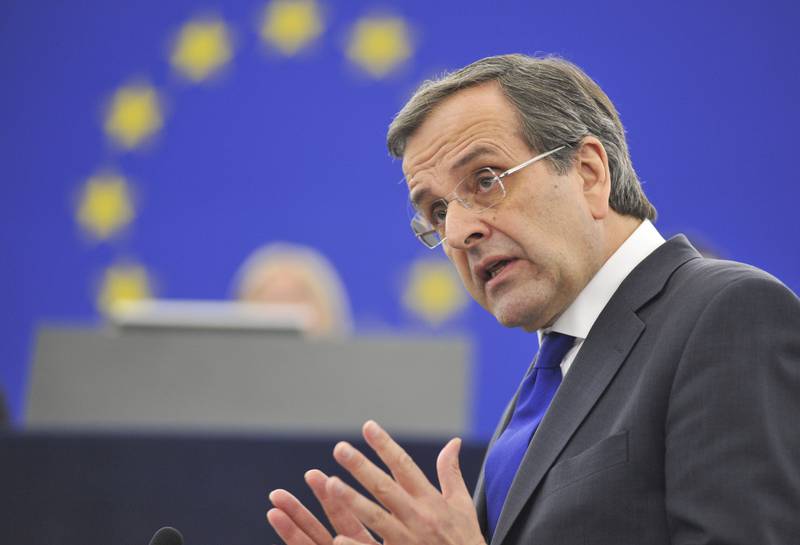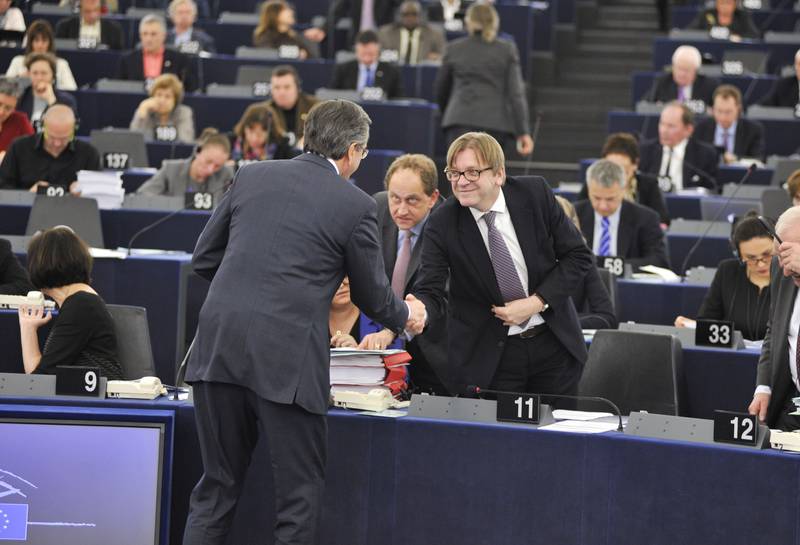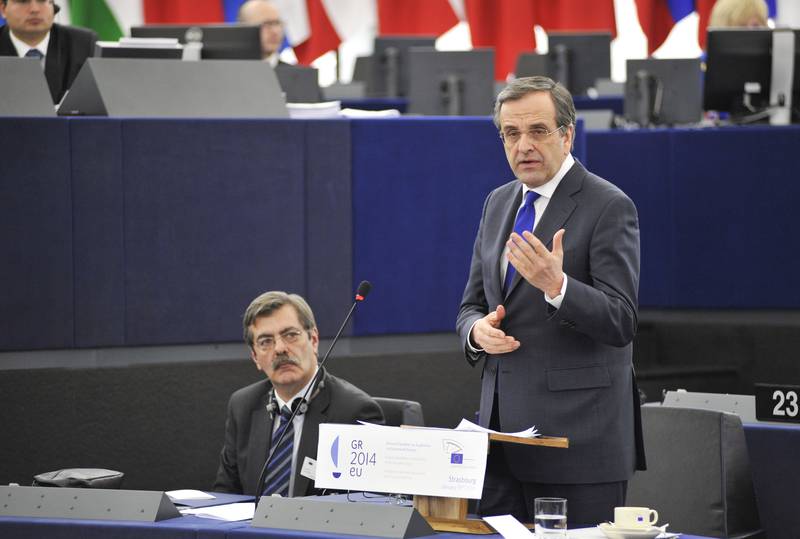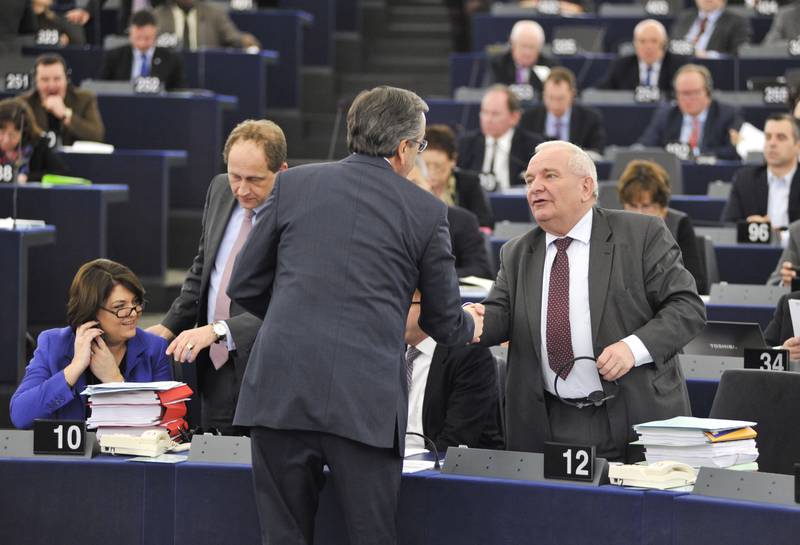Greece - a Presidency of Failure or of Success?
Adelina Marini, January 17, 2014
 "My country has been tried in recent years to the point that no other member of the European Union ever has. It has been tried on account of its own mistakes, which went on for decades. It was even tried on account of structural weaknesses of the single currency". No, these are not the words of an analyst or part of Jose Manuel Barroso's or Herman Van Rompuy's speech. These words belong to the prime minister of the country that admits it is the main culprit for that test - Greece's Antonis Samaras. He spoke on January 15th before the European Parliament in Strasbourg on the occasion of the Greek EU Presidency which started on January 1st. Greece will chair the Council of the EU for the fifth time since its EU accession, but for the first time it faces its biggest challenge ever - to take responsibility for the failure or to lead the Union's success.
"My country has been tried in recent years to the point that no other member of the European Union ever has. It has been tried on account of its own mistakes, which went on for decades. It was even tried on account of structural weaknesses of the single currency". No, these are not the words of an analyst or part of Jose Manuel Barroso's or Herman Van Rompuy's speech. These words belong to the prime minister of the country that admits it is the main culprit for that test - Greece's Antonis Samaras. He spoke on January 15th before the European Parliament in Strasbourg on the occasion of the Greek EU Presidency which started on January 1st. Greece will chair the Council of the EU for the fifth time since its EU accession, but for the first time it faces its biggest challenge ever - to take responsibility for the failure or to lead the Union's success.
Greece is the country which marked the beginning of Europe's biggest division since the establishment of the community - to a north and south, to rich and poor, to successful and failing states. This is the country that put to the test the very survival of the biggest pride of European integration - the common currency. Greece put to the test the Europeans' perception of solidarity and community. Before the MEPs Antonis Samaras said his country was tried in the past years for its own mistakes being made for decades, but the next sentence that it also revealed the structural flaws of the single currency as well as the errors in the first bailout programme, show that lessons have not yet been learnt entirely and that Greece might not be able to turn its own loss into a victory for Europe.
Jose Manuel Barroso, the European Commission chief, and also some MEPs stated that Greece had proved Europe works. Prime Minister Samaras said it himself too: "A year and a half ago, we were the weakest link in the Union. Today we are assuming the EU Presidency and I believe that Greece thus becomes the symbol that Europe can survive the crisis, Europe can go forward, that Europe works and it can make it". However, the price of this "success" is, in Antonis Samaras's own words, the biggest fiscal adjustment in the world in the shortest period of time ever - a budget deficit reduction of 13% in only four years. This is on the back of a shrinking of the gross domestic product by 25 per cent, the biggest since the Great Depression of the 1930s. The Greeks' standard of living has dropped on average by 38%, while from 7% unemployment skyrocketed to the highest in the entire EU - 27%. The scariest in those figures, though, is that the number of the young unemployed (those below 25 years) has jumped to 60% of all unemployed.
The moods of the political groups in the Europarliament toward Greece were divergent, but quite telling about how the most democratic institution of the EU lives outside reality while, in the same time, having succeeded since the beginning of the crisis to become one of the most powerful bodies for European politics. Something so important as the question "Why Greece happened?" was replaced by usual political bickering with a view of the European elections in May. And if it is easy to explain why politicians of Nigel Farage's category spoke entirely in the election format, it is worth rebuking the chief of the biggest political group in the European Parliament and also a caretaker leader of the EPP, Joseph Daul (France), who did not use the moment to analyse the work of his own party in the search of a solution to the crisis in general, but in Greece in particular. Instead, he offered a statement that is hard to remember which, obviously, was aimed at sparing a representative of a sister party the criticism, even if that is the Greek premier.
Much more support, however, Samaras got not from his own in the EPP, but from their biggest rival - the Party of European Socialists. Hannes Swoboda (Austria), leader of the political group of Socialists and Democrats, said in the very beginning that he believed in the Greek Presidency, but he did not say what that belief was based upon. Moreover, his statement started with the words that the job of the Greek prime minster was not an easy one but that it was a personal choice to become a premier. According to the Austrian MEP, the Greek Presidency will be important not only for Greece, but for Europe at large. The country had done many reforms, tough and difficult. However, the reforms process is only beginning. This is not the end of reforms, he underscored. But instead of pointing a finger to the mistakes, Hannes Swoboda again used the case to attack the Troika for the reforms it imposes and which several sentences earlier he hailed.
"Many of the demands of the Troika are not acceptable because they are rather destroying the social network", Swoboda said and called for a gradual phasing out. He also raised the question the former Greek finance minister and now a minister of foreign affairs, Evangelos Venizelos put forward some time ago - why is Greece required to pay back its debts so quickly? Germany and Austria got nearly one hundred years to pay their dues, the Austrian MEP recalled.
 The most severe criticism the Greek premier got from the chief of the Liberals in the EP and one of the wannabe candidates for the position of the European Commission president - Belgian MEP Guy Verhofstadt. He said Greece was a symbol of the best and the worst of Europe. On the one hand, it gave the name of "our beautiful continent", but on the other hand, it has created the worst crisis in its history. "The Greek crisis is a little bit of a quintessence of the European crisis - a lack discipline for a long period, a lack of solidarity for a long period and a lack of responsibility", said the former Belgian prime minister. He equally blamed the European leaders and national elites for the current situation because, according to him, they had to demonstrate solidarity with Greece in the very beginning. "We've got collective responsibility here", he added, responsibility of the European leadership, but of the Greek political class, too, which launched the reforms too late.
The most severe criticism the Greek premier got from the chief of the Liberals in the EP and one of the wannabe candidates for the position of the European Commission president - Belgian MEP Guy Verhofstadt. He said Greece was a symbol of the best and the worst of Europe. On the one hand, it gave the name of "our beautiful continent", but on the other hand, it has created the worst crisis in its history. "The Greek crisis is a little bit of a quintessence of the European crisis - a lack discipline for a long period, a lack of solidarity for a long period and a lack of responsibility", said the former Belgian prime minister. He equally blamed the European leaders and national elites for the current situation because, according to him, they had to demonstrate solidarity with Greece in the very beginning. "We've got collective responsibility here", he added, responsibility of the European leadership, but of the Greek political class, too, which launched the reforms too late.
In Greece, there still is clientelism, huge state ownership, over-sized public sector. The reform that has been done so far is to moderate wages, Verhofstadt recalled. And Europe's biggest mistake is from December 2009 when Greece did not receive immediate support. And when in January 2010 began the open talk about a grexit, that marked the beginning of Europe's financial destabilisation. Guy Verhofstadt said, though, that Greece had a unique chance to apply the lessons learnt over Europe. But for the purpose, you need to go to Berlin tomorrow, he added. The only three priorities of the Greek presidency have to be acceleration of the integration of markets - communication market, bond market and labour market.
The co-chair of the group of Greens and European Free Alliance, Rebecca Harms (Germany), also criticised Samaras, but because the reforms he is boasting were mainly on paper. She said she visited Greece several times in the past years and what the Greek premier claims is not entirely true. All achievements are on paper while reality is deploring and inappropriate for a European country in 2014. On behalf of the European Conservatives and Reformists (ECR), Martin Callanan (UK) thanked for the grand vision of Europe which Samaras "entertained" the MEPs with all morning. However, he said, it is this grand vision that has ruined the life of the Greeks. "The Greek federalist dream has become a nightmare for many people", Callanan said and recommended lessons to be drawn from the crisis.
"In France, President Hollande is beginning to see how disastrous socialism can be. He’s almost embracing capitalism. He’s even calling himself a social democrat, rather than a socialist! Unfortunately his credibility is now gone. But in the EU I fear we are not willing to learn the lessons of the Euro crisis, and if we don’t learn them, we are destined to repeat them", the British conservative added. He is also of the opinion that Greece is in the unique position to sound the alarm and warn what the cost is of grand abstract plans. A major priority of the Greek Presidency has to be to propose a looser and freer Europe. "But, unfortunately, you have chosen business as usual".
Gabrielle Zimmer (Germany), leader of the group of United Left, warned, for her part, against Greece turning its presidency into an arena for domestic politics. The debate in Strasbourg on January 15th lasted more than three hours, which is rare when a prime minister is involved. The debate showed, however, very clearly the gaps in the European Union. Because it is not only about the deep crisis that was caused by Greece, but also by the deep flaws in the European architecture and in many other areas. For example, Antonis Samaras mentioned in his introductory remarks in Strasbourg that he would work for the EU enlargement, emphasising that his country always supported and worked for the enlargement process. Alas, in his statement he never mentioned Macedonia, whose accession talks are being blocked by Greece because of the unresolved dispute on the name of the former Yugoslav republic.
If Greece was really so committed to the enlargement process it would have drawn the necessary lessons even from its own European integration and would have committed to accelerating the search of a solution to the Macedonian issue. The European Commission and analysts are unanimous that the more Macedonia stays out of the negotiating process the worse the situation in the country is getting. And that is quite clearly seen in the last progress report on Macedonia, presented by Commissioner Fule in October. Greece failed to mention what it thinks about Turkey's integration as well, which has been taken out of the freezer in 2013 with the opening of a new chapter for the first time in three year's time. Antonis Samaras's statement makes it clear that we should rather expect a new freezing of Turkey's European path. He said, responding to criticism by MEPs on this question, that "each candidate should  completely recognise and respect the existing member states. This has nothing to do neither with Greece nor with Cyprus but with our own institutional integrity as a Union".
completely recognise and respect the existing member states. This has nothing to do neither with Greece nor with Cyprus but with our own institutional integrity as a Union".
Samaras did not answer another question, too, which affects not only him, but some of the countries from the former communist block - the return of totalitarianism and the temptation to take away freedoms with unclear motives. The Greek prime minster was provoked by Bulgarian MEP Andrey Kovatchev (EPP) to pay attention to the political crisis in Bulgaria. According to him, the political situation in Bulgaria represents a serious challenge because "in Bulgaria the ghost of behind-the-scenes is stalking, led by former agents of the communist State Security, the result of which is a lack of an effective fight against corruption, xenophobia and anti-European deals. And that is happening with the blessing of the president of the European Socialists, Mr Stanishev, who bears the mandate of the current Bulgarian government". Mr Kovatchev also called on Mr Samaras to give a mandate to the Commission to hold negotiations with Russia on the legality of the South Stream project.
Samaras was blamed by MEPs also for the way his government treated the equivalent of the Bulgarian party Ataka in Greece - Golden Dawn. Without specifically answering Andrey Kovatchev's question, the Greek premier explained that Golden Dawn showed how thin the line was between unmasked populism and disguised extremism. On the occasion of Nigel Farage's attacks and other critics in the Europarliament, Mr Samaras responded ironically pointing out that he would rather not ruin the anti-European agenda of nationalists. He also apologised for Greece's return to the normal states. When we restore normality, the need of a Golden Dawn will vanish on its own, he said.
Irony, though, will not help to resolve all problems the EU is facing and which it has the ambition to solve by the euro elections, which is a wishful thinking. Samaras himself pointed out, that he hoped at the elections the citizens not to be with a bitter taste from the crisis, but to feel, "to hope" that the crisis is overcome and that Europe is exiting stronger and better. There is no way that feeling to be fuelled only by words. That is why the Greek Presidency, indeed, is a convenient moment to make a very deep analysis of the problems of the European integration, some of which euinside wrote about. Greece can, indeed, be the good example of what should and should not be done, but it also can use the six  months of its presidency to secure a new deal for a haircut of its enormous debt. Which path will Athens choose, we are yet to witness.
months of its presidency to secure a new deal for a haircut of its enormous debt. Which path will Athens choose, we are yet to witness.
But it would be good, though, if the political forces in the country, led by the government, were aware that they have zero confidence as in their home Greece, but in Europe as well. Antonis Samaras's performance in the Europarliament was quite impressive. He should address more often the European public to explain the work his government is doing. This could solidly change the moods toward his government and his country. It would also disperse a large part of the prejudices and myths and would shut the mouths of many of the populists. And finally, a piece of advice to the Greek presidency - consider yourselves a first Greek presidency, not a fifth, because this could help you leave a hallmark instead of being remembered as the presidency that closed the chapter of European romanticism and opened that of the return of nationalism in Europe.
 Federica Mogherini | © Council of the EU
Federica Mogherini | © Council of the EU | © Council of the EU
| © Council of the EU Luis De Guindos | © Council of the EU
Luis De Guindos | © Council of the EU Klaus Regling | © Council of the EU
Klaus Regling | © Council of the EU Mario Centeno | © Council of the EU
Mario Centeno | © Council of the EU Mario Centeno | © Council of the EU
Mario Centeno | © Council of the EU